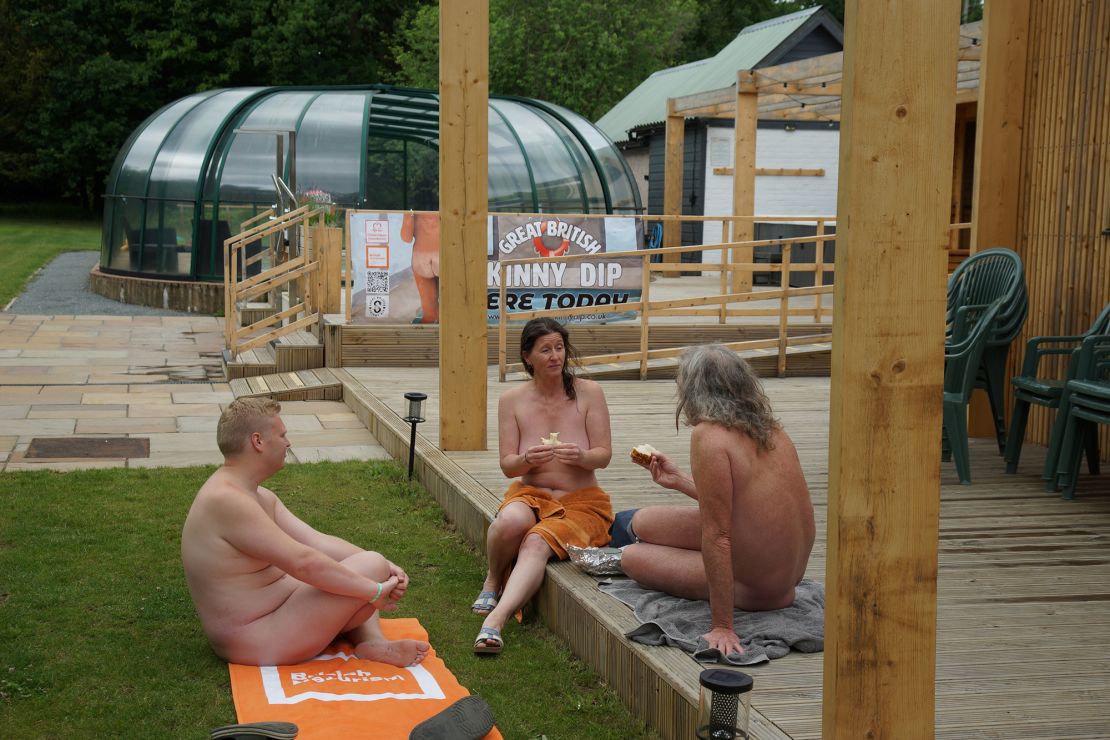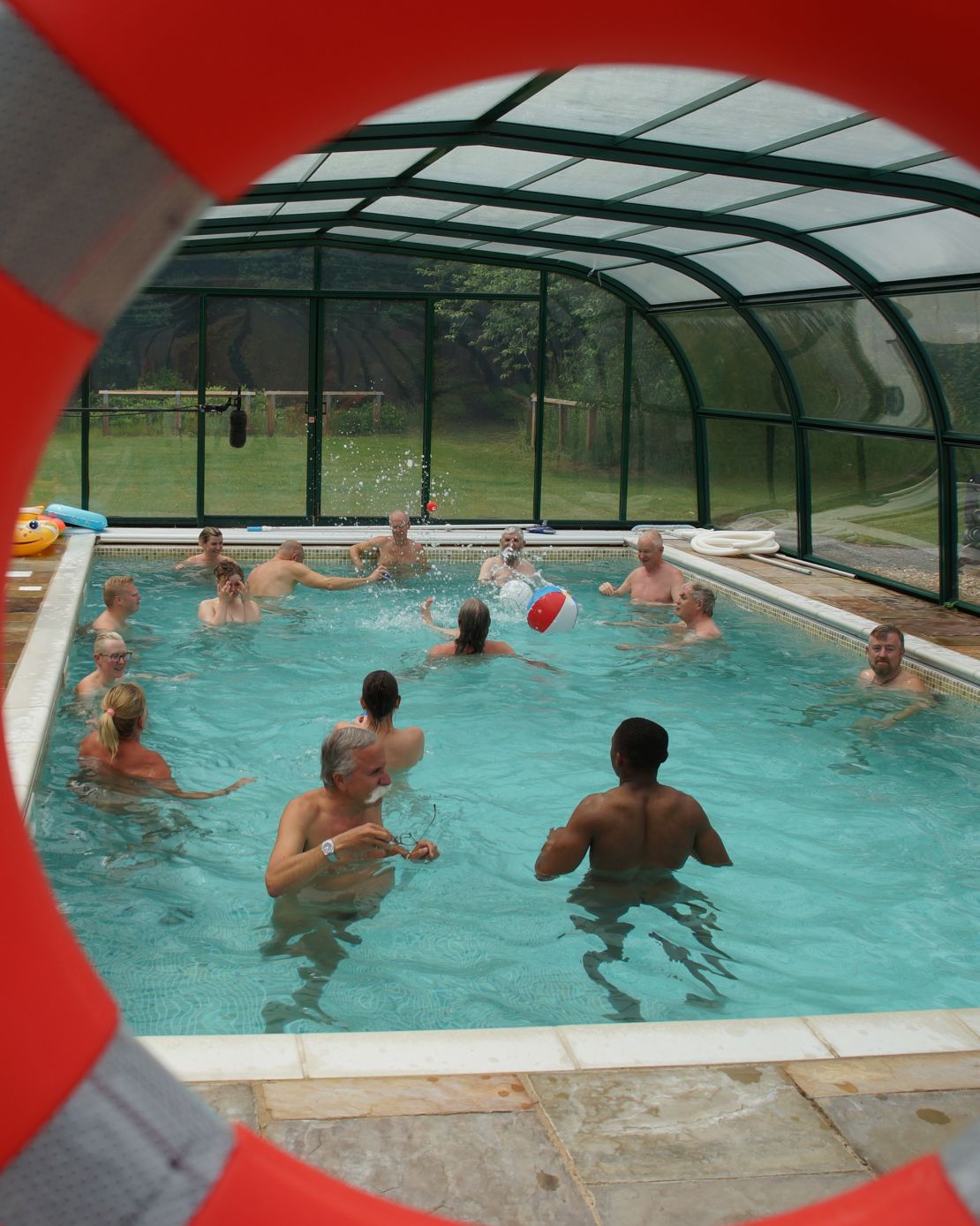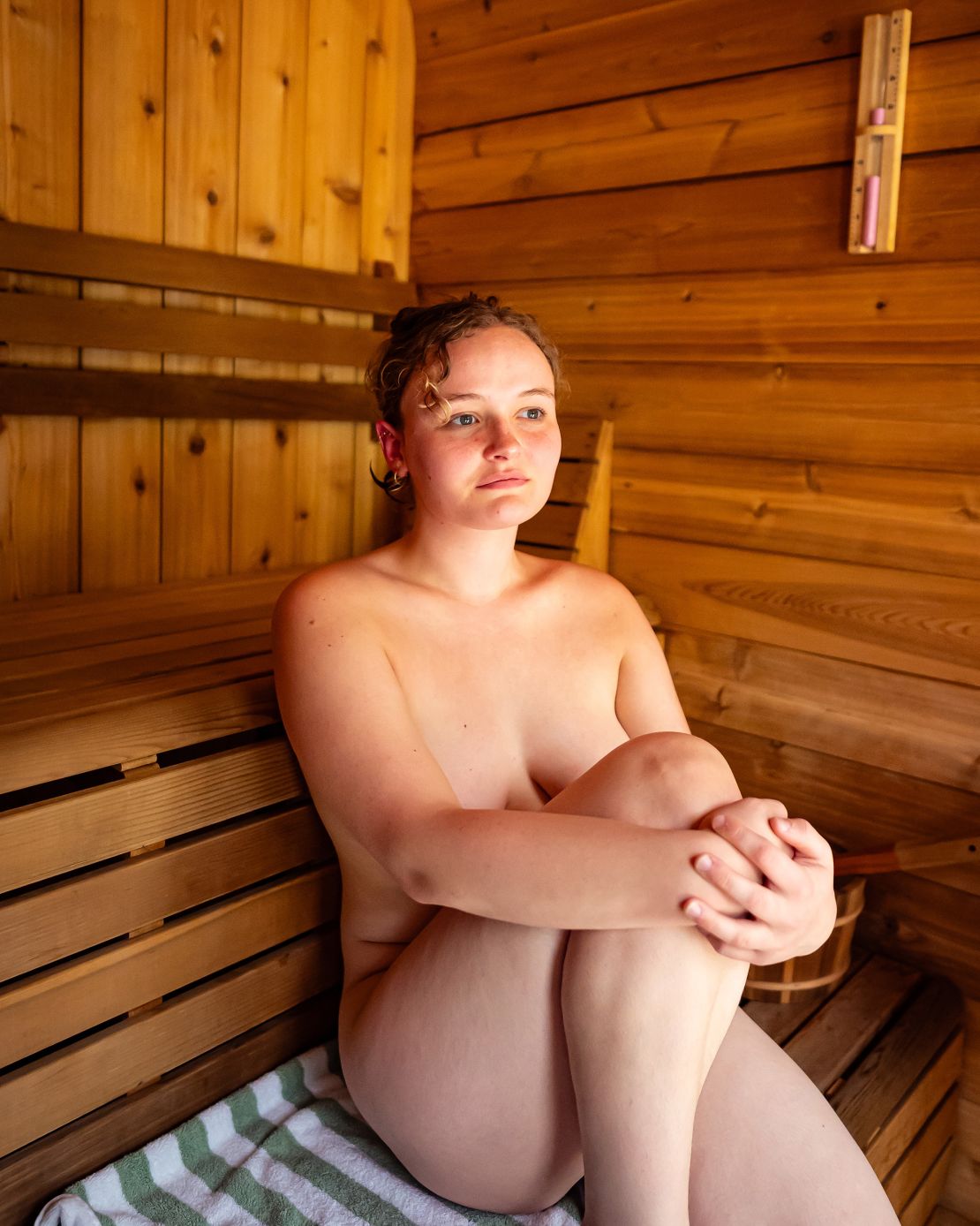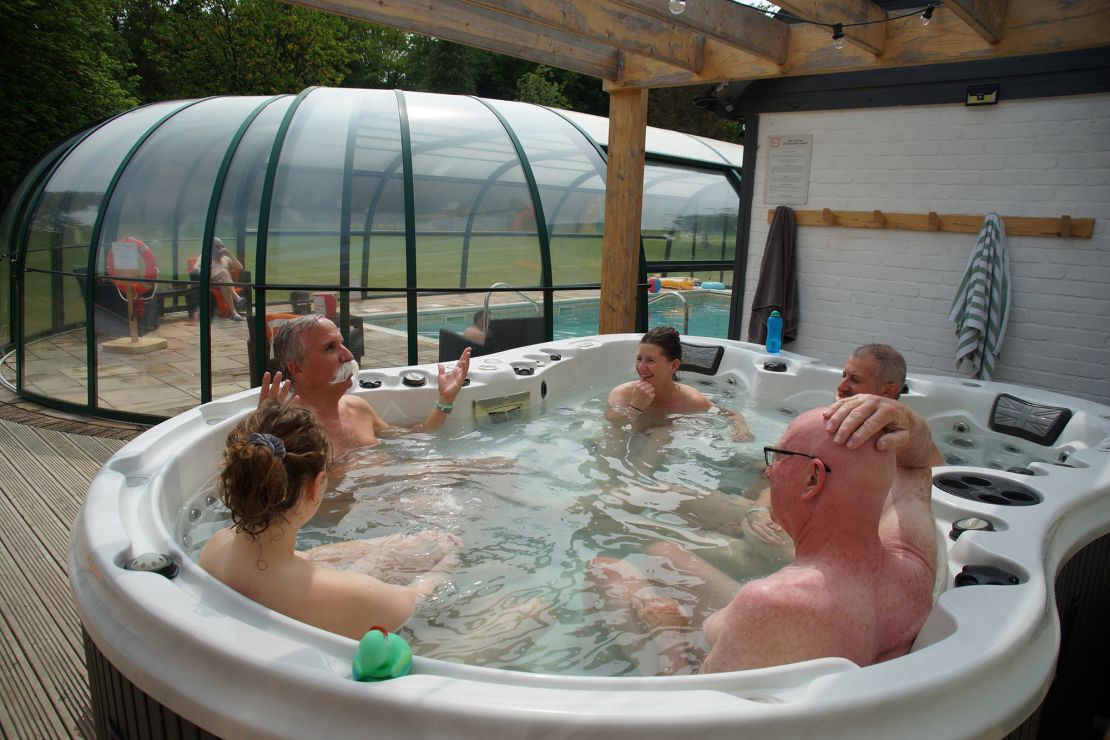Editor’s note: Sign up for Unlocking the World, CNN Travel’s weekly newsletter. Get news about destinations, plus the latest in aviation, food and drink, and where to stay.
St Albans, England
CNN
—
“Naturism is about liberating your body and accepting who you are,” says Stéphane Deschênes, a twinkly-eyed Canadian with an impressive white handlebar mustache.
We’re gathered near the hot tub for the opening ceremony at British Naturism: Sunfolk, a 94-year-old naturist site that’s relaunching after a modern makeover.
As president of the International Naturist Federation (INF-FNI), Deschênes has traveled 3,000 miles to St Albans, a small historic city in London’s commuter belt, which is home to three naturist clubs.
The five-acre site is bucolic: cocooned by mature woodland, with landscaped lawns edged by rhododendrons and a tadpole-filled brook.
There’s an inviting new sauna, a heated pool with floats and toys, plus outdoor showers with a full range of toiletries.
Five smart new glamping pods are nearby, as is a campfire area and a clubhouse with a communal kitchen and an honesty bar with snacks, drinks and ready meals.
It feels like a peaceful oasis, just an hour away from the grit and congestion of central London.
Despite the temperamental British weather (gray skies and gooseflesh are a seasonal hazard) most of the 40 or 50 bodies at this summer celebration are duly liberated.
It’s a jolt at first, seeing habitually veiled organs out and about, but it’s easy to make the adjustment — look at faces, like you normally would. And if your eyes strike flesh when glancing downwards, slide them courteously right.
Before long, the naked bodies feel as natural a part of the scenery as the veteran trees that have been surveying this site for close to a century.
‘Time has moved on’
Mark Bass, president of British Naturism, wearing a tool belt to hold his microphone set, addresses the crowd of naturists, some as young as their 20s, but most in midlife or older.
Years of work have gone into restoring the Sunfolk site to the charm of its post-World War II heyday, when parties were common and archive photographs show happy naked families thronging the site.
“Time has moved on,” he says. “The attitude towards actually joining societies, joining clubs, has waned.”
Membership of national naturist organizations is in decline around the world. Even in Germany, home of the trailblazing “Free Body Culture” (FKK) movement, city councils have been reducing their number of clothing-free naturist beaches.

Although social nudity has a long history, the modern naturist movement developed in Europe in the late 19th century and gained popularity throughout the world in the 1920s and 1930s.
While naturism is about freedom of the body, explains Deschênes, it’s not about decadent abandon.
“You feel free from the shackles, the bonds, of society, in terms of body shame and everything else,” he says. “But, arguably, naturist environments have more rules than mainstream society in a lot of ways.”
Naturism’s utopian ideals of non-sexual social nudity are founded on respect, community, egalitarianism and harmony with nature.
In today’s era of OnlyFans and rampant individualism, those values can seem prim or quaint, particularly for younger people who don’t want to disrobe alongside people from their parents’ or grandparents’ generation.
However, it’s by no means time for naturism to get its coat.
A century on from the movement’s peak, there are in fact several factors suggesting Western society could be ripe for a nude renaissance.
Growing appetite for nude recreation
In 2022, an independent survey commissioned by British Naturism found that a surprising 14% of UK adults defined themselves as naturists or nudists, up from previous British Naturism surveys, which found 6% in 2011 and 2% in 2000.
For the survey, naturists were defined as people who engaged in activities such as sunbathing or swimming without clothes.
In the UK, at least, it seems there is a significant hidden appetite for getting bare and breezy. Around the world, we’re also in a boom time for opportunities for nude recreation, from naked yoga classes to clothing-optional cruises to flesh-friendly festivals.
Traditional club membership might be in decline, but there has also been a huge diversification in the clothing-free lifestyle.
The British Naturism calendar alone is chock-a-block with activities every day. They lean wholesome and outdoorsy: swimming competitions, pottery classes and country walks with the Stark Trekkers rambling group.

Today we also have social factors which echo those of the early 20th century and the first naturism boom.
“People had suffered horrifically with our First World War,” says Bass of the first naturists at Sunfolk. “They’d been very restricted, and they were just looking for freedom. They wanted to reclaim their lives.”
Spielplatz, a naturist resort and residential village next door to Sunfolk — tagline: “The place to be when you have nothing on!” — was also founded at this time.
“If we think about where we are now, we see very similar things,” says Bass. “We’ve seen Covid and those restrictions, we’ve seen restrictions that we find in ordinary lives.
“Across society, we are facing a mental health pandemic because we are constantly told we are not good enough, that we don’t look the right way, and many of us are struggling with our mental health. Naturism isn’t going to fix that, but it can be a big part of the solution.”
‘Protecting naturist spaces’

The movement’s focus on community, for example, is one counterbalance to the loneliness epidemic which the World Health Organization has declared a global priority.
At Spielplatz, resident Hazel Ryan tells me, a villager with dementia was able to live independently for longer, thanks to neighbors being able to “point him home.”
The leisure offering at British Naturism: Sunfolk also fits well with outdoorsy modern wellness trends such as wild swimming and the Scandi-style saunas currently popping up on Britain’s beaches and at scenic beauty spots.
“If we think about what comes next and what the future holds,” Bass tells his fellow naturists, “none of us here are the future” of the movement.
Their roles, he says, are as its stewards. “We want to be protecting naturist spaces and providing opportunities for people to try naturism,” he says.
“We know there’s inequality in gender balance, as well as racial background and age within naturism. So if we’re going to tackle that, we need to be providing a safe space.”
As that rare thing, a young female naturist happy to chat on camera, Saoirse Newhouse has been in demand with the press at the opening ceremony.
“I think for young people, especially, social media has an impact. It affects people’s perception of their bodies and of the world, like some sort of hypnosis in a way,” she tells the crowd. “That’s why I believe quite strongly in (naturism), because I don’t want that to be my future. And I don’t want that to be the future of other people.”
Chris Mason, a Sunfolk warden who has followed the demographic changes at the resort over the years, has noted an increase in body positivity among Generation Z.
While the bell curve still swells at visitors in their 40s through 60s, “I’ve noticed since Covid, people are getting younger and younger,” he says. “We’re getting more in their 20s. They’re a lot more easy about it.”
Day visits start at $20

After the opening ceremony, I return with a friend for a regular afternoon at Sunfolk — this time with sunny weather.
It’s a swift 40-minute drive from north London and getting ready is easy when you don’t have to plan what to wear or even rinse your swimsuit out after.
Stripping off is a smaller leap than you might expect, when everyone else is a stranger and already in their birthday suit. It feels not unlike trying karaoke for the first time — there’s a camaraderie that comes with being all in this together, flaws and all.
There are only a handful of fellow guests (mostly midlife or older, but with one young family getting approving nods) and the atmosphere is tranquil, welcoming and entirely non-threatening.
As we lounge around the hot tub and sauna, roam the woodland, and play with Super Soakers in a pool all to ourselves, I recall the words of Helen Berriman, women’s officer for British Naturism, the day before.
“Somebody said to me once, ‘it’s difficult to be a d**khead if you’ve got no clothes on,’” she said. “It’s an unwritten rule that everyone’s got your back. It’s the safest environment to be in.”
British Naturism: Sunfolk wants to attract new people to sampling the clothing-free lifestyle and the prices here are enough to lure both of us newbies back.
It’s a mere £20 ($27) to spend a full day here and just £15 ($20) if you’re a British Naturism member. The furnished glamping pods are £80 a night while a tent camping pitch is £35 a night (with a £5 supplement per night for non-members).
For UK spa and glamping facilities, that’s an absolute steal.
“It’s so nice for us that people want to do it again,” says Andrew Welch, commercial manager for British Naturism, checking in after our visit. “Decades of social conditioning have put so many barriers in the way to what is just a lovely experience.”



